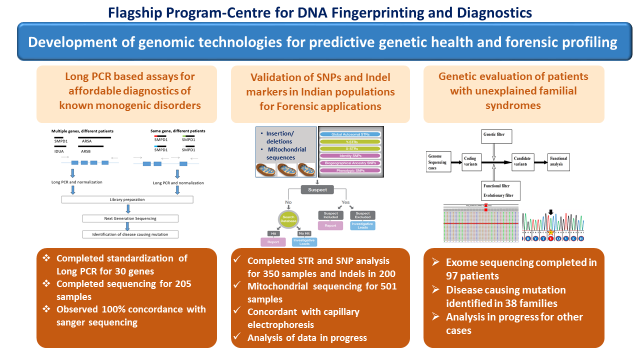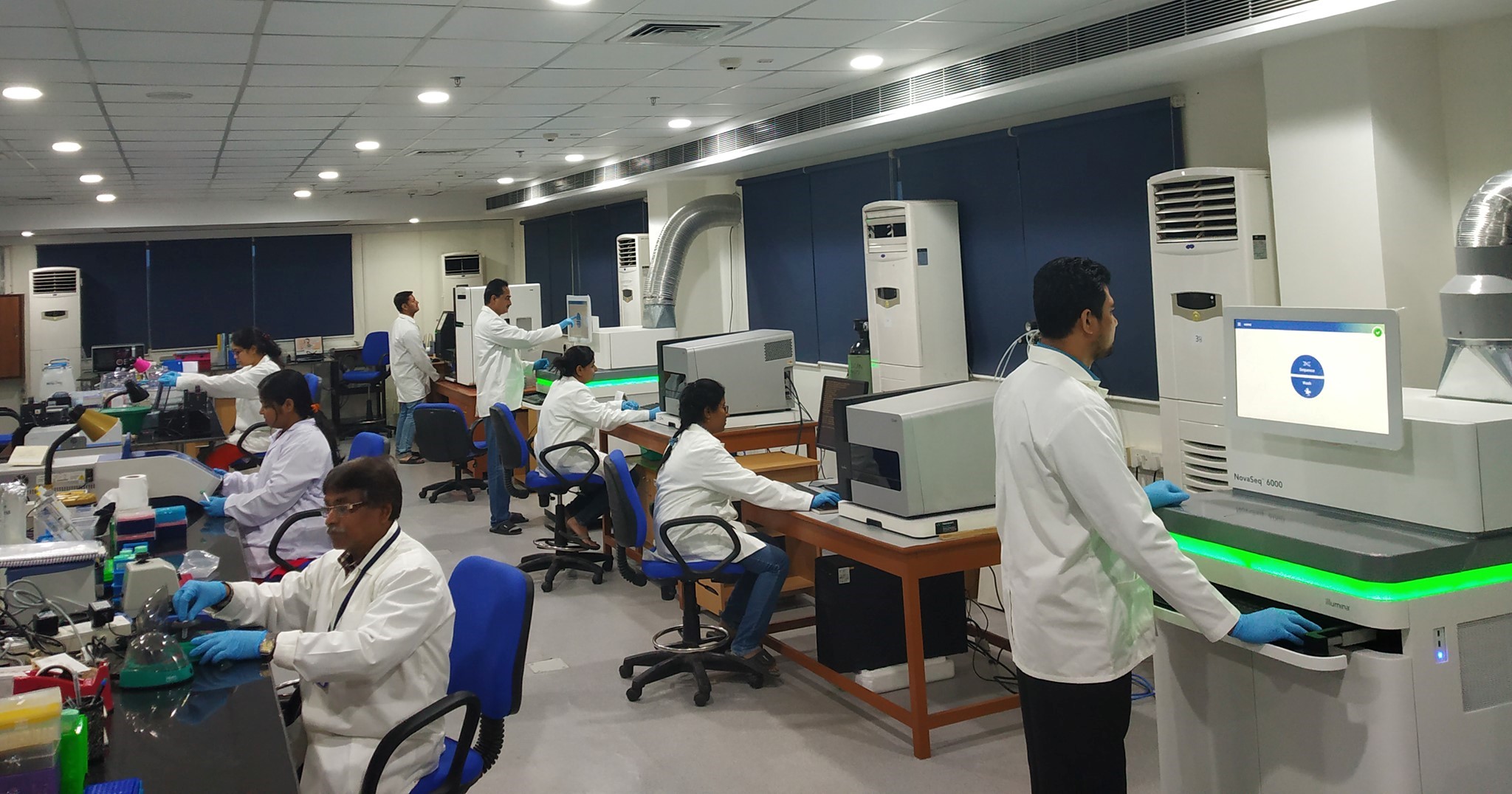HUMAN GENETICS
Human Genetics and Genomics program of the DBT supports research and development to uncover the role that the genome plays in human health and disease. The program support research across a spectrum: basic research, translational research and clinical research to establish how to use genomic information to advance medical care.
Overall aim of the program is to support R&D activities for i) understanding the role of genetic component in health and disease, and the cross-talk of these components with environmental and lifestyle factors, ii) translating the understanding thus acquired for the improvement of human health, iii) development of genomics-based strategies for prediction, diagnosis, treatment and prevention of disease, iv) development of early- warning minimally invasive diagnostic biomarkers for diseases with a genetic basis, v) building capacity in human genetics and genomics by promoting training on technology platforms and methodologies for genome analysis in relation to human health and disease, etc.
R&D Activities Undertaken
- Identify, map and characterize genes associated with genetic disorders prevalent in India.
- Understanding of mechanism of predisposition, initiation, and progression of diseases.
- Genetic epidemiological studies.
- Expression profiling studies to define biomarkers and therapeutic targets.
- Develop molecular medicine tools for better management of genetic diseases and disorders by exploiting knowledge generated by genomic studies.
Scientific Activities Undertaken
- Genome Sciences and Predictive Medicine.
- National Genomics Core
- Consortium on Celiac Disease.
- Deciphering idiopathic intellectual disability (DIID) through Next Generation Sequencing (DIID-NGS study).
- Designing NGS panel for inherited bleeding disorders to aid carrier screening and prenatal diagnosis.
- Indian Movement Disorder Registry and Biobank: Clinical and genetic evaluation of movement disorders.
- Comprehensive Molecular Studies in Monogenic forms of Diabetes in India
- Establishment of clinical database of sequence variations and elucidation of molecular mechanisms in pathophysiology of primary cardiomyopathies.
- A multi-centric effort towards understanding a high-resolution, genomic architecture of congenital non-syndromic deafness in India.
- Development of genomic technologies for predictive genetic health and forensic profiling
Thrust Areas
Transdisciplinary Translational Research in Human Genetics
- Discovery of causative genes for various Mendelian disorders
- Genetics of multi-factorial disorders with monogenic component
- Diagnostics development for human genetic diseases using genetic model organisms
- Functional validation of variants identified through next generation sequencing approaches
Rare Genetic Disorders
- Delineating the mutation spectrum of poorly-characterized rare genetic diseases and understanding the role of various mutations in the pathobiology.
- Development of affordable diagnostics for rare genetic diseases.
- Repurposing of drugs towards development of novel therapeutic solutions for rare genetic diseases.
- Development of food-based therapeutics for Inborn Errors of Metabolism.
- Development of safe and cost-effective Genome Editing and Delivery Technologies which can be used for gene therapy for rare genetic diseases.
- Development of novel viral and non-viral delivery systems for safe and effective delivery of protein and nucleic acids for therapeutics of rare genetic diseases.
- Improving the affordability of enzyme replacement therapies for Inborn Errors of Metabolism using cutting edge biotechnological approaches.
- Development of computational methods for predicting the effects of mutations in different genomic backgrounds vis-à-vis rare genetic diseases.
- Creation of biorepositories / biobank for various rare genetic diseases.
Genomic/ Precision Medicine
This new program envisaged with the aim of improving health and disease outcomes through predictive, preventive, personalized and participatory healthcare, leveraging emerging technologies such as genomics, and other ‘omics’ technologies, big data analytics, artificial intelligence and digital health with due consideration to social and ethical issues. The program will broadly focus on the following activities:
- Genomics and Population Genetics for affordable health
- Genomic / Precision Medicine focusing on Predictive Diagnostics for Genetic Disorders
- Facilitating research and development in Precision Health
- Capacity-building in the field of health genomics and big data analysis in healthcare
- Promoting Innovation Ecosystem in Precision Healthcare
Major Programs and Initiatives
National Genomics Core
‘National Genomics Core’ has been initiated to facilitate pursuit of biomedical genomics at the national level by opening up its core facilities of genome sequencing and analysis to universities and other national laboratories. Through this project, the DBT has established the National Genomics Core (NGC) with its hub in NIBMG, Kalyani, and centres in CDFD, Hyderabad. The Core aims to create a distributed, high-throughput genomics facility of international standards for stimulating transformative research and development of genomics applications for national economic growth, social and health benefits, and cultural enrichment of communities. In addition, it will also function as a distributed facility for skill development in genomics for utilization of high-throughput technologies and for storage, retrieval, computation, and statistical analysis of big data. NGC-NIBMG has been also involved with PAN-INDIA 1000 SARS-CoV-2 RNA Genome Sequencing Consortium and INSACOG projects during the ongoing pandemic to for SARS-CoV2 genome sequencing. NGC-CDFD also started offering genomic services to all academic and industry users and sequencing projects including whole genome sequencing, transcriptomic, small RNA sequencing, amplicon, ChIP sequencing have been successfully finished at facility. Nation-wide trainings and workshops have been conducted to train more than 250 participants.
Centre of Excellence Project on Genome Sciences and Predictive Medicine
In the Centre of Excellence project on Genome Sciences and Predictive Medicine at UDSC and AIIMS, New Delhi, notable progress has been made to fulfill the broad objective of this study- that is to identify potential drug targets for Rheumatoid Arthritis (RA). Three targets namely ARL15, BTK and MAP3K8 have been taken forward for lead molecule development. Computational prediction of off-target binding of 13 potential hit molecules has been performed for MAP3K8; in vitro testing of inhibition of purified BTK’s kinase activity by five selected compounds has shown highly desirable activity in the nanomolar range. Of note, functional characterization of ARL15, using a knockdown and multiomics approach has yielded novel insights into the likely mechanism of action of this small GTPase and its likely role in RA biology. Extensive structural and in vitro biochemical and biophysical studies have been done. Binding of ARL15 to GTP, as expected for a GTPase has been validated; The first three-dimensional models of ARL 15 have been devised; and efforts to solve its three-dimensional structure using X-ray crystallography made; as an alternative, in solution three-dimensional shape of ARL15 using SAXS has been obtained; & distinct nucleotide dependent movement of ARL15 uncovered. Further studies are in progress.
Consortium on Celiac Disease
In this network project, a national biorepository is being established for a well-characterized patient with celiac disease (CeD) where patients are being recruited from different parts of the country. The central Biorepository is located at AIIMS, New Delhi. The exploratory phase of the study has also provided some protein biomarkers having potential for the diagnosis of celiac disease. The validation process is ingoing. Nearly 30 percent of Indian patients with CeD do not express HLA-DQ2 or HLA-DQ8 haplotype, which is seems to be a novel finding. Such a finding may have a global implication and raises the questions how other HLA haplotype present the gluten related peptides to T-cells. In addition to patients with CeD, investigators also started recruiting first-degree relatives of patients with CeD and controls for the biorepository. The STAG further noted that availability of a well-defined cohort of patients with CeD, may further allow use of data and biological samples for research studies in the future. Since the initial results show some lead, investigators may also be able to find biomarkers for assessment of enteropathy.
Development of Genomic Technologies for Predictive Genetic Health and Forensic Profiling
The project aims to develop high-throughput sequencing-based assays for affordable diagnostics of known monogenic disorders, identification and validation of SNPs and/or InDel markers in Indian populations for determination of Identity, Ancestry, Phenotype and Lineage with enhanced discrimination, and hypothesis-free genetic evaluation of patients with unexplained familial syndromes. CDFD has completed detailed clinical and radiological evaluation of patients followed by next generation sequencing (NGS) for 47 individuals from 33 families. Exome sequencing yielded the diagnosis for 14 individuals from 12 families. Final diagnosis could not be made in other families and NGS analysis is under process for the same. Standardization of Long PCR for 10 genes and sequencing for two plates containing 150 and 160fragments respectively have been completed. 100% concordance with Sanger sequencing for the variants detected have been observed. DNA samples from 150 unrelated individuals residing across the country were sequenced on Mi Seq platform in order to get the genotype data of STRs (autosomal, Y and X-chromosome) and SNPs (identity, ancestry and phenotypic). Analysis of the autosomal data reveals that the calls from this high-throughput system was concordant with the previously generated CE data.

Contacts Concerned Officer for more Information
| Programme Head | Dr. Anamika Gambhir, Scientist G |
|---|---|
| anamika[at]dbt[dot]nic[dot]in | |
| Phone No. | 011-24363665 |
| Associate Head (Human Genetics) | Phone No. | |
|---|---|---|
| Dr. Manoj Singh Rohilla, Scientist F | manojsrohilla[dot]dbt[at]nic[dot]in | 011-24363726 |

















